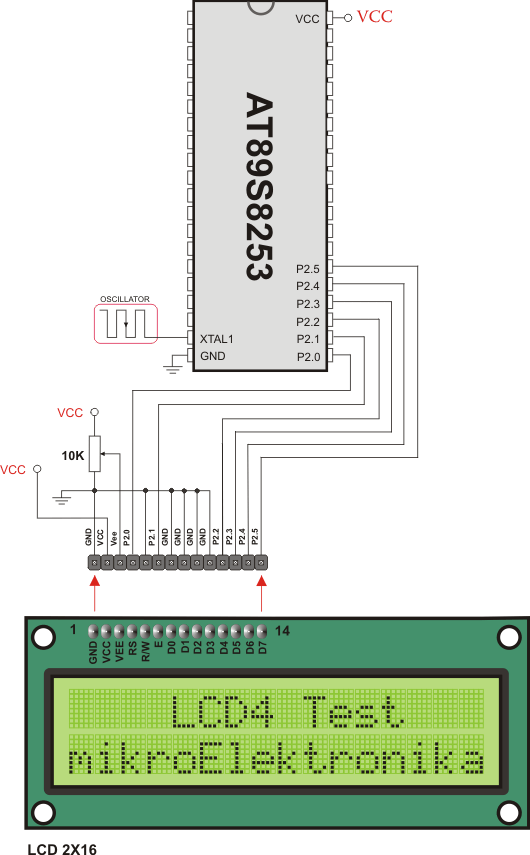Lcd Library
The mikroPascal PRO for 8051 provides a library for communication with Lcds (with HD44780 compliant controllers) through the 4-bit interface. An example of Lcd connections is given on the schematic at the bottom of this page.
For creating a set of custom Lcd characters use Lcd Custom Character Tool.
External dependencies of Lcd Library
| The following variables must be defined in all projects using Lcd Library : | Description : | Example : |
|---|---|---|
var LCD_RS: sbit; bdata; sfr; external; |
Register Select line. | var LCD_RS: sbit at P2_0_bit; |
var LCD_EN: sbit; bdata; sfr; external; |
Enable line. | var LCD_EN: sbit at P2_1_bit; |
var LCD_D7: sbit; bdata; sfr; external; |
Data 7 line. | var LCD_D7: sbit at P2_5_bit; |
var LCD_D6: sbit; bdata; sfr; external; |
Data 6 line. | var LCD_D6: sbit at P2_4_bit; |
var LCD_D5: sbit; bdata; sfr; external; |
Data 5 line. | var LCD_D5: sbit at P2_3_bit; |
var LCD_D4: sbit; bdata; sfr; external; |
Data 4 line. | var LCD_D4: sbit at P2_2_bit; |
Library Routines
Lcd_Init
| Prototype |
procedure Lcd_Init(); |
|---|---|
| Returns |
Nothing. |
| Description |
Initializes Lcd module. |
| Requires |
Global variables:
|
| Example |
// lcd pinout settings var LCD_RS : sbit at P2_0_bit; LCD_EN : sbit at P2_1_bit; LCD_D7 : sbit at P2_5_bit; LCD_D6 : sbit at P2_4_bit; LCD_D5 : sbit at P2_3_bit; LCD_D4 : sbit at P2_2_bit; ... Lcd_Init(); |
Lcd_Out
| Prototype |
procedure Lcd_Out(row: byte; column: byte; var text: string); |
|---|---|
| Returns |
Nothing. |
| Description |
Prints text on Lcd starting from specified position. Both string variables and literals can be passed as a text. Parameters :
|
| Requires |
The Lcd module needs to be initialized. See Lcd_Init routine. |
| Example |
// Write text "Hello!" on Lcd starting from row 1, column 3: Lcd_Out(1, 3, "Hello!"); |
Lcd_Out_CP
| Prototype |
procedure Lcd_Out_CP(var text: string); |
|---|---|
| Returns |
Nothing. |
| Description |
Prints text on Lcd at current cursor position. Both string variables and literals can be passed as a text. Parameters :
|
| Requires |
The Lcd module needs to be initialized. See Lcd_Init routine. |
| Example |
// Write text "Here!" at current cursor position:
Lcd_Out_CP("Here!");
|
Lcd_Chr
| Prototype |
procedure Lcd_Chr(row: byte; column: byte; out_char: byte); |
|---|---|
| Returns |
Nothing. |
| Description |
Prints character on Lcd at specified position. Both variables and literals can be passed as a character. Parameters :
|
| Requires |
The Lcd module needs to be initialized. See Lcd_Init routine. |
| Example |
// Write character "i" at row 2, column 3: Lcd_Chr(2, 3, 'i'); |
Lcd_Chr_CP
| Prototype |
procedure Lcd_Chr_CP(out_char: byte); |
|---|---|
| Returns |
Nothing. |
| Description |
Prints character on Lcd at current cursor position. Both variables and literals can be passed as a character. Parameters :
|
| Requires |
The Lcd module needs to be initialized. See Lcd_Init routine. |
| Example |
// Write character "e" at current cursor position:
Lcd_Chr_CP('e');
|
Lcd_Cmd
| Prototype |
procedure Lcd_Cmd(out_char: byte); |
|---|---|
| Returns |
Nothing. |
| Description |
Sends command to Lcd. Parameters :
Note: Predefined constants can be passed to the function, see Available Lcd Commands. |
| Requires |
The Lcd module needs to be initialized. See Lcd_Init table. |
| Example |
// Clear Lcd display: Lcd_Cmd(_LCD_CLEAR); |
Available Lcd Commands
| Lcd Command | Purpose |
|---|---|
| _LCD_FIRST_ROW | Move cursor to the 1st row |
| _LCD_SECOND_ROW | Move cursor to the 2nd row |
| _LCD_THIRD_ROW | Move cursor to the 3rd row |
| _LCD_FOURTH_ROW | Move cursor to the 4th row |
| _LCD_CLEAR | Clear display |
| _LCD_RETURN_HOME | Return cursor to home position, returns a shifted display to its original position. Display data RAM is unaffected. |
| _LCD_CURSOR_OFF | Turn off cursor |
| _LCD_UNDERLINE_ON | Underline cursor on |
| _LCD_BLINK_CURSOR_ON | Blink cursor on |
| _LCD_MOVE_CURSOR_LEFT | Move cursor left without changing display data RAM |
| _LCD_MOVE_CURSOR_RIGHT | Move cursor right without changing display data RAM |
| _LCD_TURN_ON | Turn Lcd display on |
| _LCD_TURN_OFF | Turn Lcd display off |
| _LCD_SHIFT_LEFT | Shift display left without changing display data RAM |
| _LCD_SHIFT_RIGHT | Shift display right without changing display data RAM |
Library Example
The following code demonstrates usage of the Lcd Library routines:
program Lcd_Test;
// LCD module connections
var LCD_RS : sbit at P2_0_bit;
var LCD_EN : sbit at P2_1_bit;
var LCD_D4 : sbit at P2_2_bit;
var LCD_D5 : sbit at P2_3_bit;
var LCD_D6 : sbit at P2_4_bit;
var LCD_D7 : sbit at P2_5_bit;
// End LCD module connections
var txt1 : array[16] of char;
txt2 : array[9] of char;
txt3 : array[8] of char;
txt4 : array[7] of char;
i : byte; // Loop variable
procedure Move_Delay(); // Function used for text moving
begin
Delay_ms(500); // You can change the moving speed here
end;
begin
txt1 := 'mikroElektronika';
txt2 := 'Easy8051B';
txt3 := 'Lcd4bit';
txt4 := 'example';
Lcd_Init(); // Initialize LCD
Lcd_Cmd(_LCD_CLEAR); // Clear display
Lcd_Cmd(_LCD_CURSOR_OFF); // Cursor off
Lcd_Out(1,6,txt3); // Write text in first row
LcdOut(2,6,txt4); // Write text in second row
Delay_ms(2000);
Lcd_Cmd(_LCD_CLEAR); // Clear display
Lcd_Out(1,1,txt1); // Write text in first row
Lcd_Out(2,4,txt2); // Write text in second row
Delay_ms(500);
// Moving text
for i:=0 to 3 do // Move text to the right 4 times
begin
Lcd_Cmd(_LCD_SHIFT_RIGHT);
Move_Delay();
end;
while TRUE do // Endless loop
begin
for i:=0 to 6 do // Move text to the left 7 times
begin
Lcd_Cmd(_LCD_SHIFT_LEFT);
Move_Delay();
end;
for i:=0 to 6 do // Move text to the right 7 times
begin
Lcd_Cmd(_LCD_SHIFT_RIGHT);
Move_Delay();
end;
end;
end.

Lcd HW connection
What do you think about this topic ? Send us feedback!



